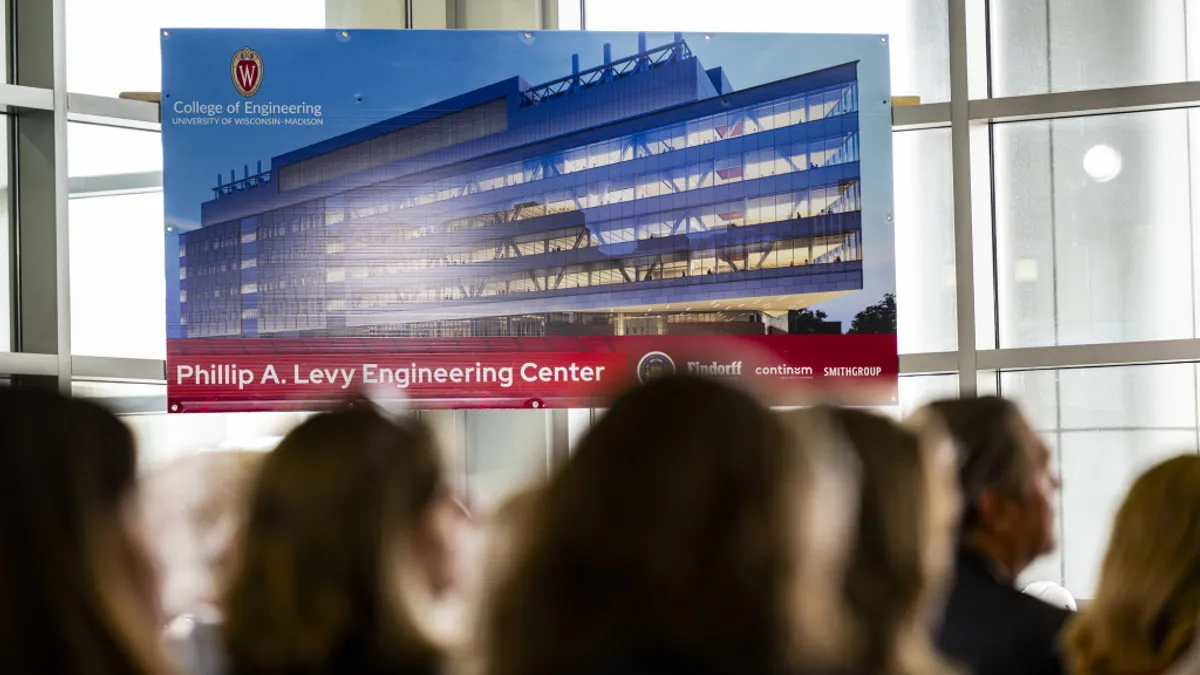This was supposed to be modular’s moment.
After all, modular construction offers a fast, efficient way to build structures in a controlled factory setting using fewer workers, who can more easily comply with social distancing and personal protective equipment (PPE) protocols than at a traditional commercial construction site.
But something unexpected happened on the way to modular and offsite construction’s sustained COVID-19 surge.
After experiencing a rapid uptick in demand for non-permanent emergency medical facilities and rapid response units when the pandemic started, manufacturers of permanent modular structures — the pods and boxes that go into hospitals, apartment buildings and hotels — say much of what they had on their books going into 2020 has now been put on hold.
According to these observers, permanent modular construction in the healthcare, multifamily and hospitality sectors, three categories where modular had made some of its biggest inroads into commercial construction in the United States, has been significantly impacted.
In addition, as the spring turned to summer, even emergency modules became less in demand. Ryan E. Smith, director and professor of Washington State University’s School of Design and Construction and a long-time modular industry consultant, said the initial flurry of activity in the nonpermanent, emergency healthcare space petered out as priorities shifted.
“Rapid response was very popular as COVID first was happening,” Smith said. “But then, as the summer went along, governments realized they had all these empty buildings because people were at home, so why not just repurpose that space [instead]?"
For example, the U.S. Army Corps of Engineers repurposed the 470,000-square-foot Javits Center in New York City as an alternative care site with a 2,100-bed capacity, and has worked on at least 37 other similar projects at other sites throughout the country since the pandemic began.
Pivoting in place
The challenges brought on by the COVID-19 crisis have forced modular firms to pivot and rebuild their books, which highlights what modular is supposed to be able to do well — adjust and retool rapidly when the market changes. And on the nonpermanent front, the industry delivered.
“A lot of our members are busier than ever,” reported John McMullen, marketing director for the Charlottesville, Va.-based Modular Building Institute, an industry trade organization. “The industry is proud of the fact that members can pivot so easily from one project to another and really address the needs that are in front of us.” (Disclosure: MBI is the sponsor of this column, but does not influence its content.)
On the permanent side, though, things have now slowed.
A case in point is Philadelphia-based EIR Healthcare, the permanent healthcare pod manufacturer that builds the MedModular “hospital room in a box.” The firm debuted the product in 2018 as a purchase option on Amazon.com to much fanfare, and entered 2020 with a new production facility outside Philadelphia capable of delivering 100,000 square feet of product annually.
But then COVID-19 struck.
Even as hospitals sounded the alarm about being overwhelmed and running out of intensive care unit (ICU) beds, longer-term healthcare projects were being reevaluated due to the revenue hits many hospitals and health centers took when patients canceled routine doctor visits and elective procedures for fear of getting the coronavirus.
The result was often empty hospital wings and emergency rooms outside the ICU, even as those staffs dealt with or prepared for an onslaught of COVID-19 patients.
“A lot of hospitals and healthcare providers are facing significant budget challenges, so that’s been an ongoing issue of finding a way to make things happen,” said Grant Geiger, CEO of EIR Healthcare. “We had some things that got put on hold because hospitals sort of threw their hands up and decided to hit the brakes.”
As an example of a healthcare system on the ropes, he points to Oakland, California-based Kaiser Permanente, which posted a $1.1 billion net loss in Q1, and scrapped its plans to build a $900 million new headquarters in March, although the firm said neither development was related to the COVID-19 pandemic.
“I think a lot of hospital administrators feel like the ground is still shifting underneath their feet, they don't know where things are going, and they're just being more conservative about wanting to pull the trigger,” Geiger said. “We’ve had sort of a sputtering stop and start, and we’re trying to work our way through that.”
While Geiger said his new factory is still booked through the end of 2020, he’s not running full shifts, and doesn’t have so many workers on the floor that he’s had to institute more stringent social distancing criteria to build what is on his books.
“We’re not running a full line at this point, because of the amount of work we’re doing,” Geiger said.
Multiple sectors impacted
It’s not just in the healthcare space where modular orders have been put on hold, either. Take Menlo Park, California-based Katerra, the flat-pack modular juggernaut that focuses on producing multifamily boxes and grew revenues to $1.7 billion in 2019.
“There’s a bit of a pause on new projects starting, and I think a lot of it has been driven by the slowdown in the capital markets,” said Craig Curtis, Katerra’s chief architect. “People are trying to figure out the change in logistics first for how you build with all the different protocols which are different from state to state.”
Katerra closed its 250,000-square-foot modular component and finish factory in Phoenix in late 2019 before COVID-19 began, and has announced several rounds of layoffs since. But it also opened a 270,000-square-foot cross-laminated timber factory in Spokane Valley, Washington, in addition to its Tracy, California factory, and has targeted modular at one of the most ambitious levels of any U.S. manufacturer.
To accentuate what is going right for modular now, Curtis told Construction Dive he is fielding interest from developers about building apartments in the suburbs, away from the dense urban environments downtown, and that the firm is also developing a product for the emerging institutional single family built-to-rent market.
“There’s a bit of a heightened interest in suburban housing and (people) being spread out a little bit more,” Curtis said.
At Suffern, New York-based Nadler Modular, a dealer of longer-term, nonpermanent modules such as those used for school classrooms and auxiliary space, CEO Jeff Neeman has also experienced some skittishness from customers.
“Clients and projects that we've signed up from before are moving along, albeit some of them are taking more time now, because people are reviewing their budgets,” said Neeman.
A positive for the firm has been a deal for auxiliary worship space, so that attendees can maintain social distance during religious services. “The high holidays are coming, and they need extra space,” he said.
Big hit to hospitality
Demand for modular in the hospitality sector, where Marriott International provided significant momentum when it announced a major initiative to build its hotels using modules in 2017, has also taken a significant hit, Smith said.
“Hospitality has really dried up on all fronts,” Smith said. “That’s troubling, because the factories that relied on that throughput are now at 20% or 25% capacity.”
But he emphasized that permanent modular construction isn’t alone in seeing a downturn. “A lot of different building types, and construction broadly, have slowed down,” he said.
Going where the demand is
Not all builders that offer modular solutions are experiencing lower production demand, with many, including the Boldt Co., as well as Turner and PCL, celebrating the rapid response and emergency medical pods they’ve been able to contribute to fighting the spread of COVID-19.
While Boldt's rapid response STAAT Mod has generated numerous inquiries from healthcare and government organizations, Zach Lauria, senior project manager, concedes that kind of interest has still been limited to rapid response products.
“The sense we've gotten from our customers is the dust needs to settle a little bit more. The world is still pretty shaky,” Lauria said. “Once things settle down a little bit, I suspect we'll start to see people interested in other areas, but it has been primarily emergency response.”
At Quebec, Canada-based RCM Modular, which sells multifamily modules in Canada and the Northeast U.S., CEO Gilbert Trudeau said that since March, his firm has built three new rapid response hospitals in downtown Montreal, and is planning a fourth.
That’s helped make up the part of his 2020 book that was initially impacted when COVID-19 first struck. “When I went into the year, we were booked until Christmas,” Trudeau said. “When this started in March, we lost a lot of production, but we eventually gained it back with a lot of hard work.”
His new contracts didn't come cheap, though. "You can find other projects, but nothing's drawn and nothing's organized," Trudeau said. "So the cost associated with actually getting to do that new product is much more expensive, because you're rushing and trying to jam it through. It's just more difficult."
He was able to hire subcontractors to build the specialized hospital headwalls those units needed, and has even kept two small hotel projects going in upstate New York that were already in motion. He also said he’s still seeing demand for suburban apartments.
“Most of the projects that people started haven’t stopped,” Trudeau said. “But I’m not getting the new guys who want to just get into this business right now.”
_____________________________________________
The Modular Monitor series is brought to you by The Modular Building Institute (MBI), the voice of commercial modular construction. MBI has no influence over Construction Dive's coverage within this column or other articles, and its content does not reflect the views or opinions of MBI or its employees other than as a journalistic source in some cases.
As The Voice of Commercial Modular Construction (TM), it is MBI's mission to expand the use of modular construction through governmental advocacy, industry outreach, and professional development. Join us today.






















